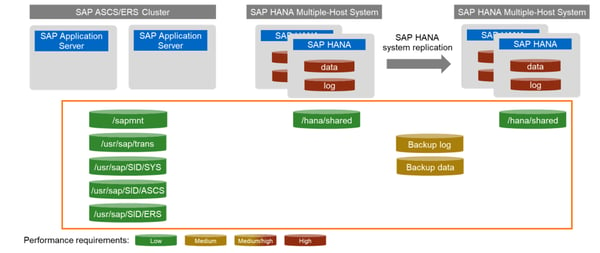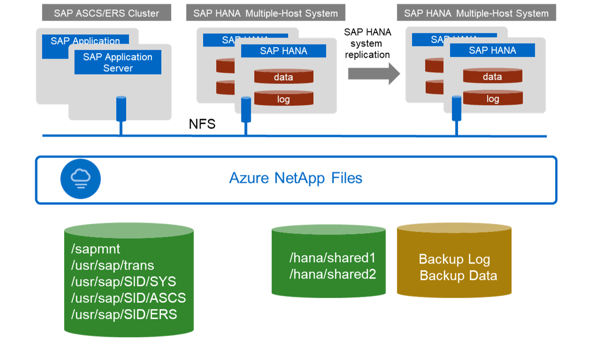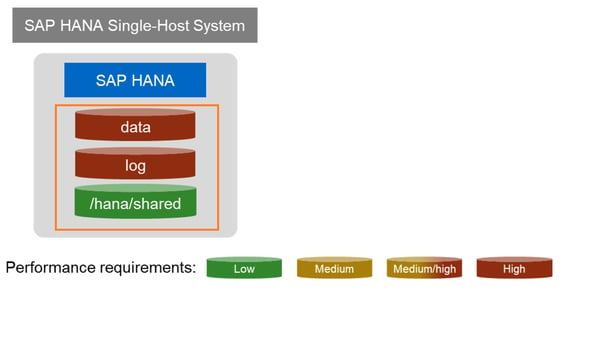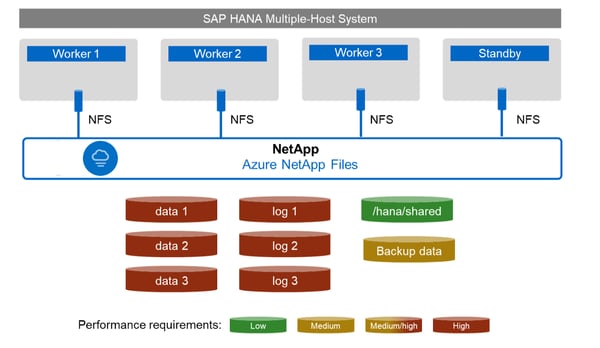More about SAP on Azure
- SAP HANA Certification: How to Choose the Right Type for You?
- SAP HANA on Azure: Architecture and Deployment Process
- SAP Cloud Platform: Developing Apps with HANA On Demand
- SAP HANA Migration: Methods and Considerations
- SAP on Azure: The Complete Guide
- SAP HANA Architecture: Components, Storage Types, and Cloud Offerings
- 5 Ways Cloud Teams Can Ensure Successful SAP Migration and Management
- Fast Track Your SAP Deployments in Azure with ANF
- New SAP Certification and Region Availability for Azure NetApp Files
- Azure NetApp Files Eases SAP Deployment in Cloud
- SAP HANA on Azure NetApp Files: Cloud & AI in Retail & Transportation
Subscribe to our blog
Thanks for subscribing to the blog.
December 3, 2019
Topics: Azure NetApp Files 6 minute read
Increasingly, organizations are beginning to deploy SAP applications in Azure due to the platform’s numerous advantages for SAP requirements, including high availability and performance, agility, and cost optimization. Customers also benefit from SAP integration with native Azure services, such as Azure Machine learning, IoT Hub, and Data Factory to accelerate their business goals. In addition to dev and test environments, customers have heavily migrated production SAP infrastructures to Azure.
Azure offers extensive support for SAP through VM SKUs optimized for target workloads. When it comes to storage, different SAP applications offer varying performance and certification requirements. Azure NetApp Files (ANF) is a first-party cloud-based NFS and SMB file share service that enables customers to meet the storage performance needs of SAP applications. In this blog, we’ll explore the many features of Azure NetApp Files that make it the ideal solution for SAP use cases in Azure.
Performance Considerations for SAP Applications
In today’s market, IT teams are under constant pressure to design SAP applications that offer lightning-fast performance capabilities. They must also be able to create agile processes and get them up and running in Azure without delay.
In some cases, organizations simply want to test the waters in Azure by rolling out changes in cloud-hosted environments and conducting quick testing before the roll out to production. In addition to high availability and reliability, the ability to overcome any potential I/O bottlenecks is a key differentiator for customers when considering storage solutions. This attentiveness to I/O is crucial in transaction-intensive SAP applications in particular because businesses cannot afford delayed response times.
One of the main reasons for migrating SAP workloads to Azure is the freedom to easily spin up environments on-demand. The main challenge here is moving large datasets, like those used by SAP applications, to the cloud to match this pace and run them without compromising performance. For most organizations, however, this speed cannot be achieved by rearchitecting or redesigning environments to fit the cloud. Rather, customers realize greater benefits by using the same architecture in the cloud without changing how the data is accessed or the protocols used—whether SMB or NFS.
Because cloud operates at an abstraction level, there are often concerns about how to achieve on-premises performance benchmarks in Azure. This challenge is particularly difficult for SAP databases and file shares. Because SAP systems host mission-critical information, the data must remain protected and secure at all times.
Azure NetApp Files addresses these concerns. This fully managed file share service in Azure is capable of meeting the extreme performance benchmarks mandated by SAP applications and is the only cloud file service certified by SAP for production database usage. It offers native integration with Azure and can be operated like any other Azure service from Portal, Rest API, CLI, PowerShell, and others. ANF also offers three service tiers to meet the varying performance demands of SAP applications. The Standard service level offers a throughput of 16 MB/s per provisioned TB, Premium offers 64 MB/s, and Ultra offers 128 MB/s.
Before discussing how ANF can help you overcome SAP deployment and performance challenges, let’s explore the typical SAP application storage requirements.
SAP Applications in Azure: Storage Requirements
In any SAP landscape, there is always a need for shared files. SAP application performance requirements, however, can vary based on the architecture. While deploying SAP applications in Azure, both SAP shared files and SAP databases (including those used by SAP HANA) benefit from a high-performance NFS file share service like Azure NetApp Files.
SAP Shared Files
Figure 1 below shows the file share and performance requirements of several different SAP deployments.

Figure 1 : Shared files in SAP deployments
While the performance requirements of the highlighted shared files (in the orange boxes) vary; a highly available NFS file share in Azure can underpin them. For eg/sapmnt, /usr/sap/trans, /usr/sap/SID/SYS, /usr/sap/SID/ASCS, /usr/sap/SID, ERS, and /hana/shared folders, the performance needs are lower; the underlying file system, however, must be highly available. For backup log and backup data, on the other hand, the file system should be capable of providing medium performance along with high availability.
The file share requirements for SAP applications can be addressed using ANF, as shown in Figure 2.

Figure 2 : Shared files in SAP deployments using ANF
File shares based on clear performance requirements can be placed in individual ANF volumes using the appropriate service level (Standard, Premium, or Ultra). Volumes are created from a capacity pool for which the size and service level can be changed dynamically based on the capacity and performance demands.
SAP Databases
Figure 3 shows the storage requirements of a typical Single-Host SAP HANA deployment.

Figure 3 : Databases in SAP deployments
The data and log volumes for an SAP HANA system can be hosted in NFS volumes along with the /hana/shared folder. It should, however, be noted that these volumes must meet specific performance criteria defined by SAP. In addition, as indicated in the Figure 3, compared to /hana/shared folder, the performance requirements are high.
For multi-host SAP systems hosted in cloud environments, a shared NFS volume is required to host both the data and log volumes. The /hana/shared should be available to all SAP HANA nodes in this architecture. This file share is critical and benefits from a highly available NFS file share in Azure. These requirements can be addressed using ANF, as shown in Figure 4.

Figure 4 : Multi-host SAP deployments using ANF
As is the case with shared files, different service levels can be combined in order to create the volumes required for the databases and log files. Capacity pool service levels can be changed on demand.
The Azure NetApp Files Advantage
Offering sub-millisecond latencies and high throughput, ANF provides near bare-metal performance for SAP workloads hosted in Azure. It is the only service in the cloud that’s certified to meet the production database Key Performance Indicators (KPIs) set by SAP HANA to support a shared, or scale-out, HANA database. ANF eliminates the need to redesign and rearchitecture of SAP environments, enabling organizations to meet their cloud-first mandate. Instead of going through the complex process of setting up NFS file servers in Azure using VMs and block storage, in a matter of seconds, the service can be provisioned and ready for integration with SAP applications.
ANF accelerates projects by automating deployments and processes to quickly spin up new environments on demand with minimal operational overhead. Customers can build and test at scale before actual production deployment, thereby addressing the possible risk factors associated with moving mission-critical SAP workloads to Azure.
To address the concerns associated with moving large SAP datasets to Azure, ANF offers seamless data migration using NetApp Data Fabric technology, such as Cloud Sync. The service is homogeneous and supports both NFS and SMB protocols, providing administrators the flexibility to use the management protocol of their choice.
Customers also benefit from trusted NetApp features like snapshot-based backup/restore for data protection and recovery. These snapshot copies are highly storage-efficient and won’t slow down performance. The datasets can also be quickly restored from snapshot-based backups or cloned for dev/test environments to spin up landscapes on demand. This capability enables agile deployment and development to meet growing business demands.
These datasets can also be restored to the cloud in order to prepare a DR environment for failover in Azure. This benefit also offers high availability and requires no additional configurations from the customer side. ANF also offers data security, supporting FIPS-140-2-compliant data encryption at rest.
SAP Deployments in Azure Made Easy
SAP workloads are without a doubt the most mission-critical for any organization. Deploying them to Azure requires a comprehensive and simple solution for your shared files and databases. With best-in-class features and performance capabilities, ANF ensures a smooth, trouble-free transition.
Read more SAP on Azure content below:
- SAP HANA on Azure NetApp Files
- New SAP Certification and Region Availability for Azure NetApp Files
- Simplifying Mission-Critical Applications in Azure
- Protect Your SAP Cloud Journey in Azure: Webinar
- Azure NetApp Files Eases SAP Deployment in the Cloud
- SAP on Azure: Optimize Your Cloud Journey
- Get Started with Azure NetApp Files today